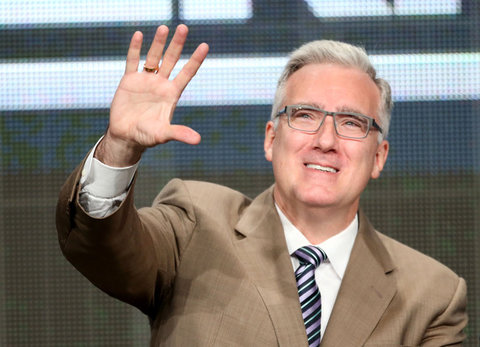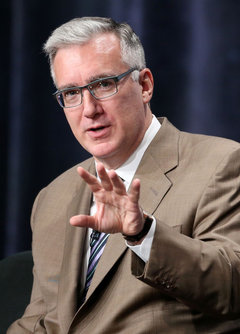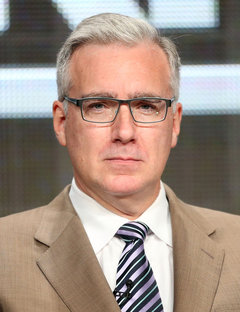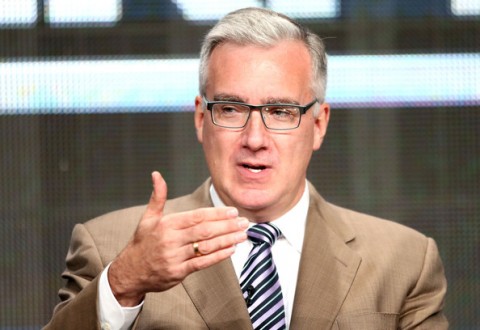The Light from the TV Shows: 10 Highlights from ESPN’s ‘Olbermann’ Panel
When it comes to sports, I have a longstanding history of being the least-knowledgeable member of the Bullz-Eye staff by far – I’ve lost track of how many editorial meetings have found me drifting into silence as the topic of conversation shifted into talk of this team’s record or that player’s performance – so I hope you can appreciate just how much of a pop culture figure Keith Olbermann has become if I’m dedicating my TV column to his return to ESPN. By all rights, I really shouldn’t care.
Like, at all.
There’s something about Olbermann, though, that I’ve always found entertaining, no matter what he’s talking about or whether I fundamentally agree with it. As such, when it was announced that he’d be attending the summer TCA tour to hype his return to ESPN, I actually wanted to be there and hear what he had to say. Unsurprisingly, he kept the crowd of TV critics happy by providing quick quips and well-considered answers to their questions, enough that I was able to put together a list of 10 highlights from his panel.

1. “For all of you who had (August 26) in your pool as to when I would return to do ESPN, congratulations. Any span over, like, 40 years, you could have picked that date. You got it right. So very well done.”
2. ” I’m not intending to talk about politics, certainly not in the partisan sense and not in the sense that I did in the last ten years of work that I’ve done, for the simple reason that it’s a sports show. And there will be occasions in which, as I said in the news conference we had last week, if Barack Obama runs onto the field during the all star game, we will have to talk about the ramifications of that during the game and perhaps for his political future. But it will not be the intent to say, you know, ‘The Chicago White Sox moved to Vancouver, Canada, today; but, first, let’s talk about what Speaker Boehner said.’ I’ve done and enjoy and own the work that I did in politics and news, but that’s not what this is. I wanted to go back into sports, and I wanted to repair some transportation means with my former employer, and I got to do both.”
3. “It’s been wonderful not talking politics. I did it for ten years, and…if there’s anything that you’d like to do after that experience, it’s a sportscast. I mean, it wasn’t a hobby that I had. It was a lot of work, and it took a lot out of me, and it was not often that much fun. So the opportunity to go back and to go back to a place where, for everything else you’ve heard about it, I had a lot of fun doing ‘SportsCenter’ two decades and one century ago, and I wanted to take that opportunity. And, fortunately, we were able to stitch all of these things together and make it happen.”

4. “There’s going to be a ’30 for 30′ on (my departures from former employers), I understand. Actually, there’s going to be three or four ’30s for 30’s.”
5. When asked if he’d taken anything from his experiences with various networks over the years into his new ESPN deal to make it less likely that history might repeat itself:
“Man, I better have at this point. Yeah. I’m 54 years old. If I haven’t figured out what parts of it were my fault… We have been talking for a year or more about my coming back in some capacity, and just the idea of the people that I worked with, some of whom I had great contentious experiences with… Norby Williamson, who is a key figure in putting both (Jamie Horowitz and I) together and putting us up on this stage today, was the line producer, was the guy who sat next to me and Dan Patrick when I got to ESPN in 1992, and then he was made the coordinating producer of ESPN2 ‘SportsNight’ when we debuted that with the famous jacket, and we had screaming matches. Norby was one of the great advocates for bringing me back because he said, ‘Yeah, we had screaming matches. They were always substantial. Could you have done them a little bit better? Could you have been a little bit more gentle about how you interacted with people and understand that they weren’t trying to, you know, mess you up in some way? Yeah. But we think you’ve gotten that point from all of the various experiences since.’
And there is the blunt reality that, whatever I thought of ESPN when I worked there, I had a lot of experience outside of the corporation. I worked for other networks and radio networks and local stations here in Los Angeles and in Boston, and I thought I had a pretty good perspective on what, you know, maybe, a place was where they didn’t agree with me all the time. I didn’t know what I was talking about. The places I went to thereafter made ESPN, in retrospect, look like, you know, a ‘let’s applaud Keith’ session for five years. So I’m very happy to be back, and my experiences have been much improved in dealing with everybody since I have gotten back.”
6. “When I left, ESPN got put on the map. ‘SportsCenter’ did it to a certain degree by its coverage of the O.J. Simpson trial. So you can bring anything you want to since then, and maybe it’s an active player who we just saw press conferences about after he was arrested for murder and had hearings today, and his coach had to come out and address it. So some things change a little bit, but there, you know, there was an NFL player arrested for murder in 1951. And as to drugs and medicine and performance enhancing things, the first one in baseball was in 1889. I mean, ‘the more things change, the more they stay the same’ is a cliche for a very good reason. So in terms of shaking off the rust, when we sat down and did this show last night, I felt a little like Rip Van Winkle, you know.”

7. “This new Internet thing that you have is ruining our ability to just throw the scores out and just say, ‘Look at these highlights. You don’t know how that Toronto/Cleveland game turned out. We are the ones who can tell you.’ Practically speaking, that’s the difference. Even in the ’90s when we programmed ‘SportsCenter’ under a man who is clearly, in this field, a genius – John Walsh – he came up with the idea that we could sort of recreate, for those fans who already knew the outcome of the game, the excitement by never giving the score until we got to the end of the highlights. So keep a little suspense if they don’t know or if they want to re-enjoy that. And this was anticipatory of the day when the fans would be tuning in already knowing all of the outcomes. So we started those shows, and I like to think that a lot of the good evolutions of sports coverage began in that era of ‘SportsCenter.’ We started by saying, ‘We are going to assume our viewers know 50 to 100 percent of the stuff. What we are here to do is to explain why it happened, hopefully, and to add some additional insight in other ways and, failing that, to just do some stupid cliches and catch phrases.’ So now here we are in 2013, and we are going to do that same kind of concept but in a 21st Century manner.”
8. “The idea that anyone could call themselves, under any circumstance and for any purpose, ‘Carlos Danger’ is a tribute to something about (Anthony Weiner). Now, I’m born and raised a New Yorker, and I guess I’ve lived probably half or more of my adult life in the city and been a taxpayer, and we have had the damnedest runs of mayors. I’m speaking just as a citizen of the city. We didn’t know what John Lindsay’s fake name was when he sent pictures of himself to people, if he did. We don’t know what Jimmy Walker did in the ’30s. But New York has had mayors who like to go to all of the fires and wear fire helmets and pretend to have the flames going. So I don’t think anything particularly disqualifies him. I would study the issues more before endorsing him. But Carlos Danger… I guarantee you, Carlos Danger will wind up in the first show of the new series somehow, even if it’s talking about Carlos Marmol of the Dodgers, and how he presents a Carlos Danger to their bull pen.”

9. When asked what makes ‘Olbermann’ different from other sports shows:
“Well, I’m on it. That’s the principal thing. And, conveniently, they were looking they were looking to do a show called ‘Olbermann,’ and I was the only person they found in the business with the name Olbermann. So it worked out pretty nicely for me. Otherwise, I probably, you know, wouldn’t be here. But, more seriously, I think you are not going to be able to bring a new component to it. Every sports program is going to be made up of a lot of the same elements, and we intend to use them. The secret to it, obviously, is the recipe and the mix and whether you can provide an alternative. Where we are, our complementary broadcast is ‘SportsCenter.’ So it should not be ‘SportsCenter.’ Well, what should it be, then? What things have I done in the past that I can bring to bear here that maybe I didn’t do the first time?
The new shows were filled with commentaries. Obviously, we are going to pull on that. We are, however because I used to just enjoy the heck out of doing the highlights and saying stupid things during them and doing funny voices, we are going to have some highlights as well. We are going to have interviewees and experts and analyses. And I think we can reveal the worst. We will be having a segment called ‘The Worst Person in the Sports World,’ because people kind of like that one, even people who weren’t that into the political game or the news game when they were watching the show. That was always a thing. People seemed to enjoy my willingness to stick my neck out and have people come back to me and say, ‘Ten years ago, you put me on the ‘Worst Person’s List,’ and I’m still angry about it because I was only third. Why wasn’t I the worst person? I was only the third worst person.’ So, obviously, we are going to adapt that. So it will be a sportscast with my stamp on it and obviously my name on it, and I’m very happy that it was spelled correctly.”
10. “I already went back to ESPN in 2005. It was in a, sort of, at arm’s length association that I was on the radio network on Dan Patrick’s radio show, first weekly and then every day. So the idea of the burned bridges not being somehow somehow being a complete impediment to my eventually going back in a larger capacity never I never really bought it in that sense. I never really thought it was worth, if you will, giving up on the whole thing. I mean, if the bridges are burned, take the tunnel, and we found a tunnel to do it. I thought that, at various stages, there would be, to some degree, greater resistance than there was. As I said, Norby Williamson who helped push this all along, and many other people were gracious, generous, and I hope correct in saying, ‘Let’s do this.’ It serves everybody’s purposes. It’s the time to do it. It’s 16 years. It’s almost literally Rip Van Winkle period of time. I mean, you know. Napoleon, I think, got back to France faster than I got back to ESPN. I don’t know that I ever said, ‘No, that will never happen,’ because, as I’ve often noted, too, if you are going to try to predict my career, good luck to you. I’ve never gotten it right for more than, like, three weeks ahead. So why not?”
Related Posts
You can follow us on Twitter and Facebook for content updates. Also, sign up for our email list for weekly updates and check us out on Google+ as well.










